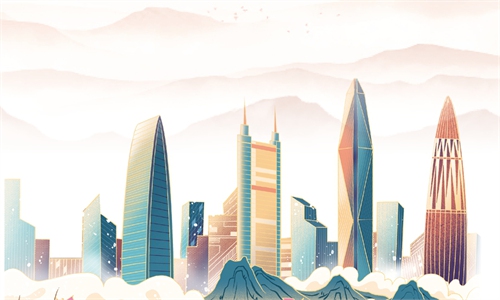
Illustration: Xia Qing/GT
Editor's Note:With China's development, more and more observers find that the previous belief, that modernization basically meant Westernization, has changed, since China has set a good example for developing countries to follow their own paths to modernization. John Pang (Pang), a former Malaysian government official, told the Global Times (GT) that a Chinese path to modernization marks the end to The End of History thesis, and that China's commitment to globalization is a deeper and higher quality globalization.
This is the second part of the GT interview with Pang. The first part focusing on China's global governance was published in November.
GT: The Chinese modernization is different from the Western development path. Do you think China's development experience can offer some inspiration and positive ideas for other developing countries?
Pang: The declaration, and more than that, the achievement, of a Chinese path to modernization marks the end to "The End of History" thesis. It puts to death the core assumption of the ideology behind the project to remake the world in the image of the US, under the hegemony of the US. This fanatical project took shape after the fall of the Soviet Union, destroyed countries, caused countless wars and killed millions to entrench a permanent unipolar order. It seeks to regime change all challenges to that supremacy today, and has identified China as its mortal adversary.
The assumption exploded by Chinese modernization is that there was only one path to modernity, through capitalism and liberal democracy. In Western social science and liberal ideology, modernization must necessarily lead to Westernization, and Westernization to the eventual destruction of all non-liberal values, of traditional cultures and societies and ways of being. To the Global South, and indeed the rest of the non-Western world, China's achievement of its own path to modernization is a spectacular demonstration that not all roads lead to a West that today more resembles a historical dead end. It offers the hope that the cultural and spiritual inheritance of each nation should continue to matter, evolve, and find expression with growing collective prosperity. While the rise of China has multiplied concrete possibilities for trade and development, China's domestic achievement opens up the political and policy horizons for other paths of modernization.
The implication is that each nation can and should, while learning from others, find its own path. This destroys the liberal myth that nations are more and less advanced according to their proximity to Western modernity, and the West's colonial expectation that it should rule the less advanced. This "multi-polar" notion of modernization already implies a globalization driven from multiple poles. A multipolar order.
GT: Previously, you mentioned that we will end up with the bloc of an isolated West, with the rest of the world carrying on with a non-Western globalization. Would you elaborate on the view? You have also noticed that behind Chinese President Xi Jinping's call for the equal rights, rules and opportunities is an aspiration for "a just, fair, multipolar world order." How do you view the China-proposed vision - a community with a shared future for mankind?
Pang: I wrote that in response to this anxiety, expressed by many in Southeast Asia today, concerning the risk of "global decoupling." As the US intensifies its attack on the Chinese economy, we face increasing pressure from the West to choose sides. This goes against everything ASEAN stands for and depends on: open, non-zero-sum, non-exclusive relationships. Hence we have seen unusually stern statements from Southeast Asia that "the West should not force us to choose. We will refuse to choose."
If, despite these protestations, the West continues to push for decoupling, it will discover, not just with ASEAN but with the entire non-Western world, the folly of trying to unroll globalization, to revert to the mercantilist blocs of an earlier era, each with its own enclosed supply chain and trade regime serving a colonial metropole. Like a child who saws off the branch he is sitting on, the West will discover that it is sitting on the branch, and not the trunk, of the real global economy.
Instead of mirroring the West, China has doubled down on its commitment to globalization, and indeed to a deeper and "higher quality" globalization that prioritizes the development that the Global South hungers for. Its promise is credible because it has done what it is talking about. The West will find it has walled itself in, and destroyed its credibility as a partner, with lawless sanctions, tariffs, export controls, property seizures and attempts at extra-territorial jurisdiction. Outside the West, a non-Western globalization will resume after a hiatus of a few centuries. Global patterns of trade and cultural interaction along the Silk Road, across the Indian Ocean and between China and the "South Seas" did not begin with "the West" as a project that subjugated the mass of humanity. It will not end with the "return of the West."

